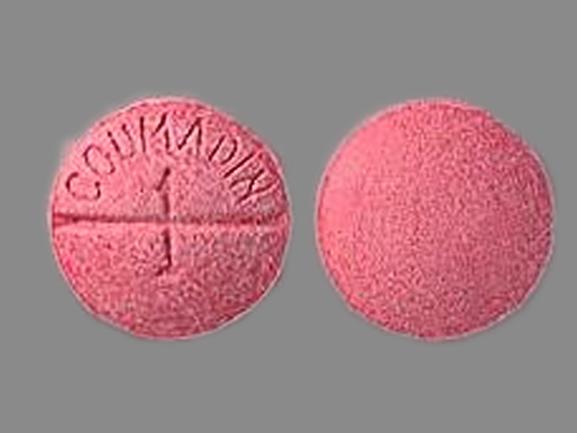Coumadin Interactions
There are 682 drugs known to interact with Coumadin (warfarin), along with 8 disease interactions, and 6 alcohol/food interactions. Of the total drug interactions, 179 are major, 432 are moderate, and 71 are minor.
- View all 682 medications that may interact with Coumadin
- View Coumadin alcohol/food interactions (6)
- View Coumadin disease interactions (8)
Most frequently checked interactions
View interaction reports for Coumadin (warfarin) and the medicines listed below.
- albuterol
- allopurinol
- amlodipine
- aspirin
- atorvastatin
- Colace (docusate)
- Coreg (carvedilol)
- digoxin
- furosemide
- gabapentin
- hydrochlorothiazide
- Lasix (furosemide)
- levothyroxine
- Lipitor (atorvastatin)
- lisinopril
- metformin
- metoprolol
- multivitamin
- omeprazole
- oxycodone
- potassium chloride
- prednisone
- Protonix (pantoprazole)
- simvastatin
- Synthroid (levothyroxine)
- tramadol
- Tylenol (acetaminophen)
- Vitamin B12 (cyanocobalamin)
- Vitamin C (ascorbic acid)
- Vitamin D3 (cholecalciferol)
Coumadin alcohol/food interactions
There are 6 alcohol/food interactions with Coumadin (warfarin).
Coumadin disease interactions
There are 8 disease interactions with Coumadin (warfarin) which include:
- bleeding
- diabetes
- hypertension
- liver disease
- protein C deficiency
- decreased response
- increased response
- renal dysfunction
More about Coumadin (warfarin)
- Coumadin consumer information
- Compare alternatives
- Reviews (22)
- Drug images
- Side effects
- Dosage information
- Patient tips
- During pregnancy
- Support group
- Drug class: coumarins and indandiones
- Breastfeeding
Related treatment guides
Drug Interaction Classification
| Highly clinically significant. Avoid combinations; the risk of the interaction outweighs the benefit. | |
| Moderately clinically significant. Usually avoid combinations; use it only under special circumstances. | |
| Minimally clinically significant. Minimize risk; assess risk and consider an alternative drug, take steps to circumvent the interaction risk and/or institute a monitoring plan. | |
| No interaction information available. |
See also:
Further information
Always consult your healthcare provider to ensure the information displayed on this page applies to your personal circumstances.


